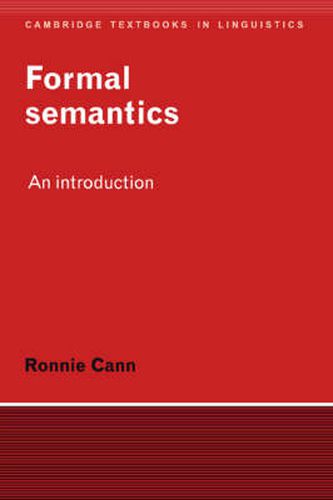Readings Newsletter
Become a Readings Member to make your shopping experience even easier.
Sign in or sign up for free!
You’re not far away from qualifying for FREE standard shipping within Australia
You’ve qualified for FREE standard shipping within Australia
The cart is loading…






This book provides a clear and accessible introduction to formal, and especially Montague, semantics within a linguistic framework. It presupposes no previous background in logic, but takes the student step-by-step from simple predicate/argument structures and their interpretation through to Montague’s intentional logic. It covers all the major aspects, including set theory, propositional logic, type theory, lambda abstraction, traditional and generalised quantifiers, inference, tense and aspect, possible worlds semantics, and intensionality. Throughout the emphasis is on the use of logical tools for linguistic semantics, rather than on purely logical topics, and the introductory chapter situates formal semantics within the general framework of linguistic semantics. It assumes some basic knowledge of linguistics, but aims to be as non-technical as possible within a technical subject. Formal Semantics will be welcomed by students of linguistics, artificial intelligence and cognitive science alike.
$9.00 standard shipping within Australia
FREE standard shipping within Australia for orders over $100.00
Express & International shipping calculated at checkout
This book provides a clear and accessible introduction to formal, and especially Montague, semantics within a linguistic framework. It presupposes no previous background in logic, but takes the student step-by-step from simple predicate/argument structures and their interpretation through to Montague’s intentional logic. It covers all the major aspects, including set theory, propositional logic, type theory, lambda abstraction, traditional and generalised quantifiers, inference, tense and aspect, possible worlds semantics, and intensionality. Throughout the emphasis is on the use of logical tools for linguistic semantics, rather than on purely logical topics, and the introductory chapter situates formal semantics within the general framework of linguistic semantics. It assumes some basic knowledge of linguistics, but aims to be as non-technical as possible within a technical subject. Formal Semantics will be welcomed by students of linguistics, artificial intelligence and cognitive science alike.